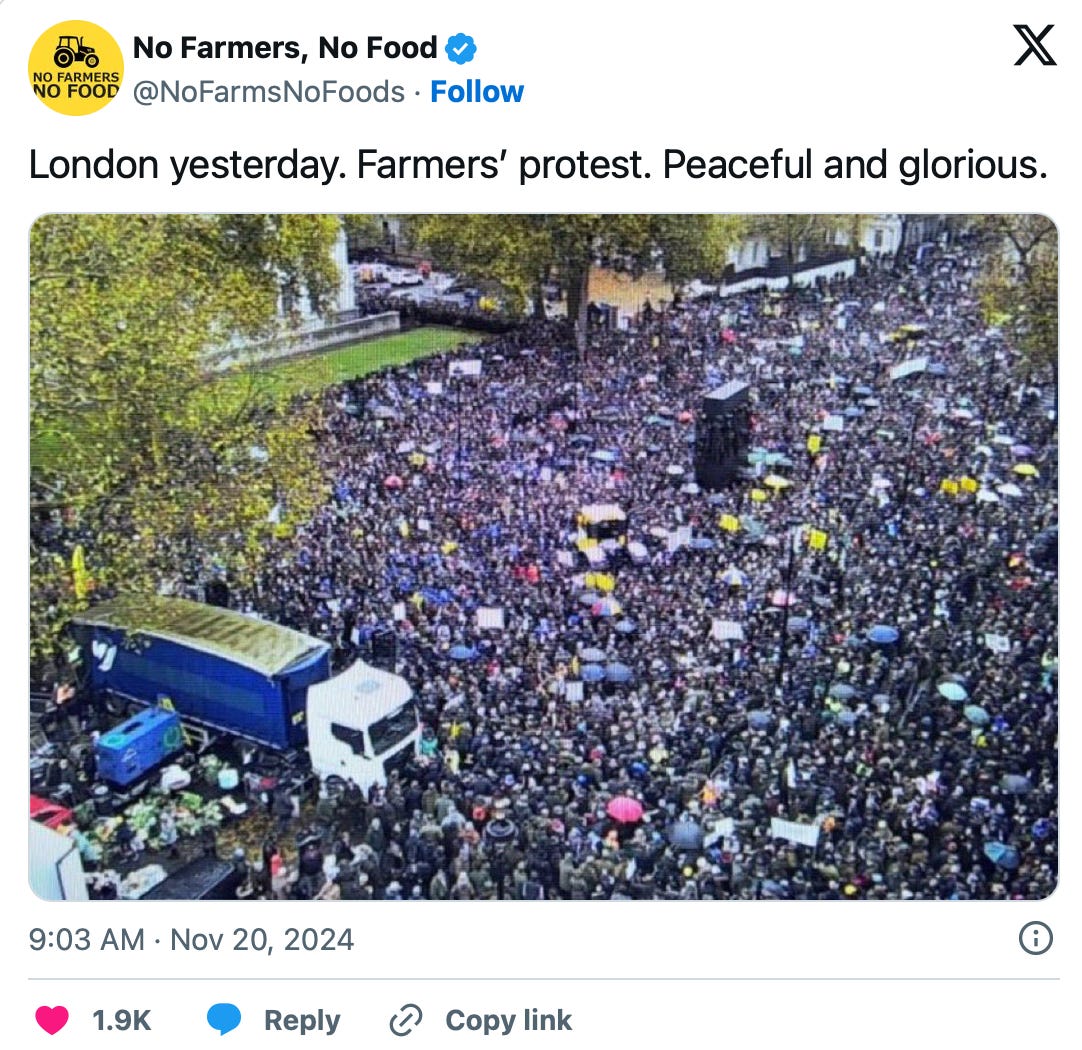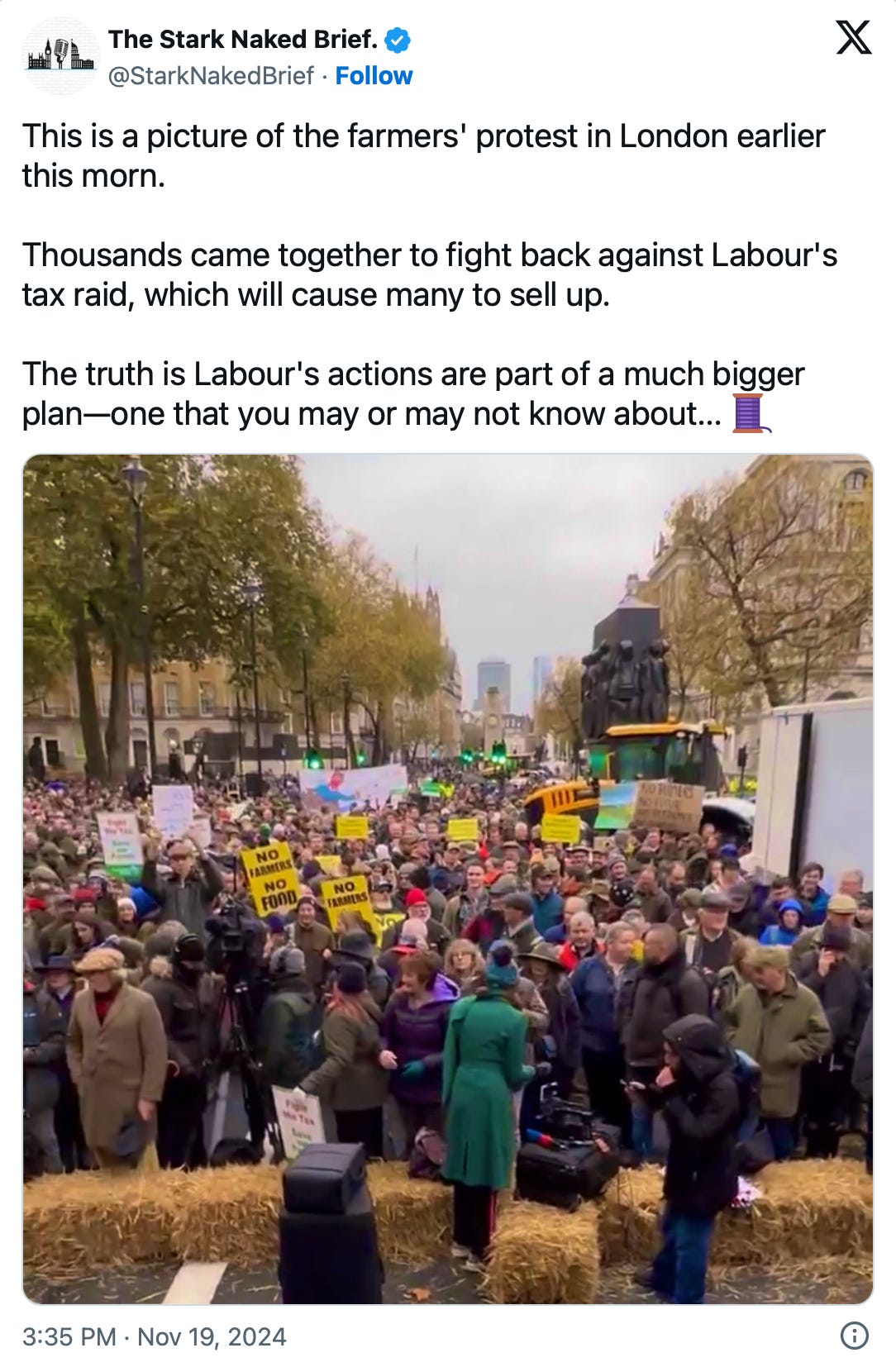“Bitcoin Offers A Solution To The Global Farming And Economic Crisis“ Forbes, 20 November 2024
An estimated 16,000 to 20,000 people gathered in London to peacefully protest a proposed inheritance tax that threatens to cripple family farms. Addressing the crowd, television presenter and farmer Jeremy Clarkson warned, "This tax is the final nail in the coffin for British farming. It will force families to sell land they've worked on for generations."
Energy, the environment, jobs, tax receipts, and health outcomes are linked to our food. This is not just rhetoric; it’s the foundation of how societies function. Recent Labour government policies fail to interlink and correctly incentivize these connections. This creates challenges for systems that require cohesion, placing pressure on farmers and the nation.
A System That Constrains Farmers
Farmers face mounting pressures within a challenging fiat system. Rising inflation pushes up costs for everything from seeds to machinery, while poorly designed taxes and subsidies strip away margins. The proposed inheritance tax shows a policy that overlooks these vital interconnections.
Energy drives food production. Farmers have untapped potential to contribute to sustainable energy solutions. With the right policies, farms could host bitcoin mining operations that use excess or stranded renewable energy, creating additional income streams for farmers while supporting energy efficiency. By repurposing waste heat from mining, farms could reduce their operational costs, aligning energy production with agricultural needs.
An example of this synergy is seen in the Netherlands, where a tulip farmer has partnered with a bitcoin mining firm to repurpose the heat generated by mining rigs to warm their greenhouse. This solution has helped cut natural gas dependency with soaring energy prices, while the mining operation itself is powered by solar energy, reducing environmental impact. This ‘win-win’ model ensures environmental viability and offers farmers additional income and resilience against rising costs. If similar initiatives were adopted in the UK, farms could explore carbon-negative solutions while addressing both energy challenges and financial pressures.
Farms cannot power without affordable energy or implementing sustainable practices. Government subsidies are directed toward wind farms, overlooking localized, practical energy solutions that could directly benefit agriculture.
Incentives favoring synthetic alternatives, such as fake meat, divert resources from traditional food production. This short-term approach impacts those who care for the land and does not benefit wider society. Dale Vince, a Labour Party ‘megadonor’ donor and founder of Ecotricity, has championed plant-based diets and proposed measures like a red meat tax to encourage ‘sustainable’ food choices. His influence raises concerns about potential biases in policy-making that may not align with the interests of traditional farmers.
Jobs and tax receipts are linked to food. A healthy agricultural sector provides rural employment and contributes to the national economy. Policies like the cap on farm payments at £80,000 next year disincentivize growth, leaving farmers struggling to make ends meet and weakening the communities that depend on them.
Health outcomes are linked to food. The importance of healthy food production cannot be overstated. As the United States begins to scrutinize the quality of its soil, sustainable farming practices, and chemicals in food under RFK Jr.’s 'Make America Healthy Again' initiative, similar conversations will likely gain traction in the UK.
If Labour genuinely wants to reduce NHS costs, the solution is clear: enable farmers to produce fresh, locally grown food that reduces reliance on processed imports. This approach would curb public health challenges like diabetes, heart disease, and long-term dependence on medications, ultimately easing the strain on healthcare systems.
Locally grown, fresh food is vital for a healthy population. When farms fail, communities rely on imported, processed food, which worsens public health challenges, places further strain on healthcare systems, and, of course, contributes to the warming of the planet.
Bitcoin Threads Sovereign Systems Together
This protest highlights a systemic failure to align incentives. Farmers face the consequences of a fiat economy that prioritizes short-term revenue over long-term sustainability. Fiat money is disconnected from physical reality and the land, while bitcoin restores that connection. Bitcoin provides an alternative, linking these connected systems together with incentives that promote stability and growth.
This is not lost on the bitcoin community, which is full of people who advocate for healthier lifestyles like Saifedean Ammous, author of bitcoin books such as “The Bitcoin Standard,” who popularized the idea that “fiat food” systems shaped by government policies are hurting both communities and economies across the globe.
Unlike fiat money, bitcoin operates on a fixed supply, resisting inflation and offering a store of value. As the best-performing asset of the decade, bitcoin has proven its resilience.
Farmers, like bitcoiners, can use sound money to plan for the future without fear of their wealth being eroded. Bitcoin’s decentralized nature also removes reliance on intermediaries, empowering individuals to control their own economic outcomes.
Bitcoin aligns incentives across interconnected systems. By integrating bitcoin mining into agricultural systems, farms can become innovation hubs. Using renewable energy sources and repurposing waste heat for food production demonstrate how technology can work in conjunction with traditional practices.
Mining operations often use stranded or renewable energy sources, demonstrating how sustainability can coexist with innovation. Its decentralized network encourages efficient resource use, such as repurposing waste heat, working alongside nature rather than against it. A bitcoin economy creates jobs, generates economic activity, and promotes stability, reducing inequality and improving health outcomes by mitigating the instability of fiat systems.
Farmers and bitcoiners are fighting the same battle. Both want to preserve what they’ve built for the next generation. As Russell Rukin, a UK Bitcoiner, put it, 'We should be self-sovereign for the majority of our food. It is a dreadful idea to be reliant on farmers outside of our borders, just as it is a bad idea to have money and state tied to political whim.' Both groups face systems that distort value and undermine legacy. The Labour government’s lack of joined-up thinking worsens these struggles, creating policies that harm society’s very foundations.
As global conversations about food quality, farming practices, and resilience grow louder, the UK must stay ahead of these issues. Ignoring the links between farming, health, and energy could leave Britain lagging behind in a world increasingly focused on integrated solutions. Supporting farmers with better policies and forward-thinking technologies like bitcoin is good for politics and essential for national sovereignty and long-term prosperity.
Energy is linked to food, the environment is linked to food, jobs are linked to food, tax receipts are linked to food, and health outcomes are linked to food. And all of it is tied together by incentives. Bitcoin offers a path forward, joining these systems into a cohesive whole.
Without farmers, there would be no food, and without sound money, there would be no growth. Perhaps, inspired by Americans across the ocean who are now considering how bitcoin factors into their national debt reduction strategy, British legislators may consider how bitcoin could factor into a more self-sovereign future.




